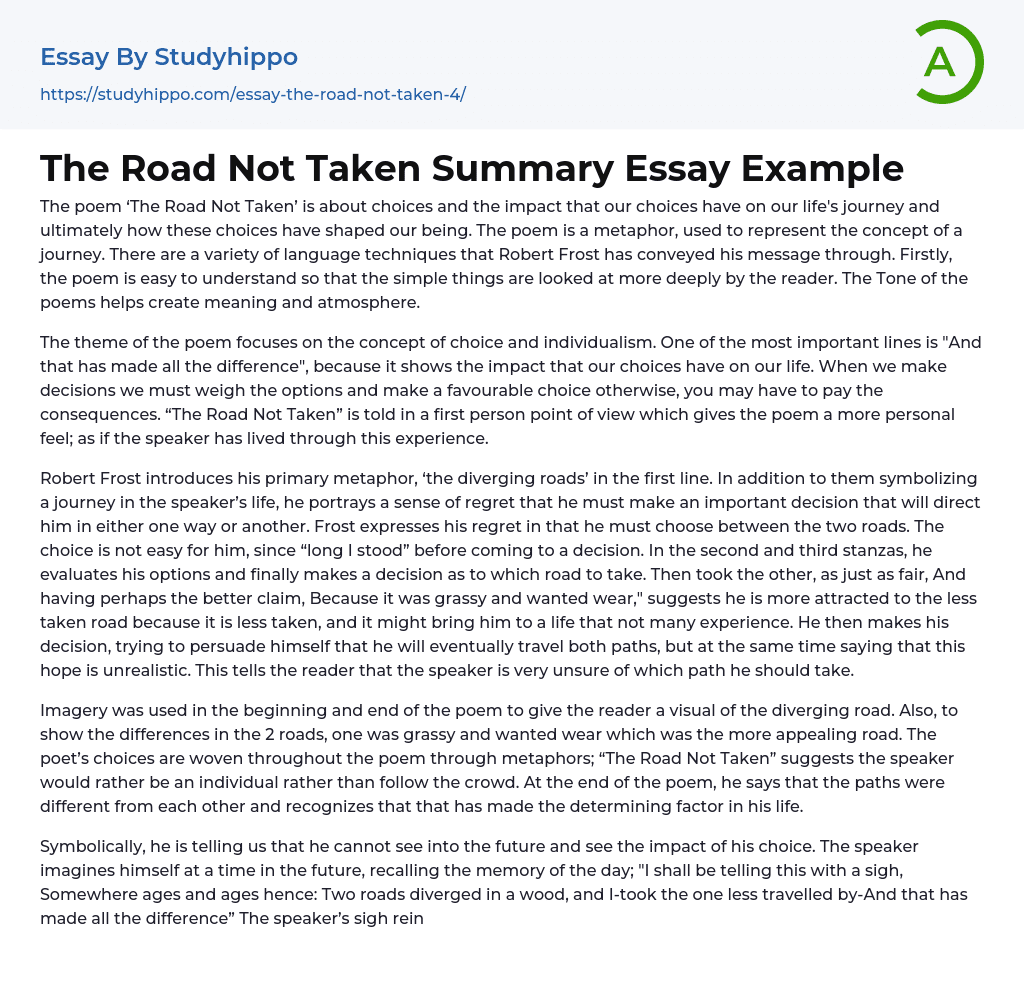The poem 'The Road Not Taken' by Robert Frost explores the theme of choices and their impact on our life's journey. It serves as a metaphor for a journey, and Frost employs various language techniques to convey his message. The simplicity of the poem encourages readers to deeply contemplate even the smallest details. Furthermore, the tone of the poem contributes significantly to its meaning and overall atmosphere.
The poem explores the concept of choice and individualism, highlighting the impact our decisions have on our lives. It emphasizes that making a positive choice is crucial to avoid negative consequences. By using a first-person point of view, the poem creates a personal tone, as if the speaker has personally encountered this situation.
...
In the first line, Robert Frost introduces his primary metaphor, 'the diverging roads', which symbolize a journey in the speaker's life. He also conveys a sense of regret as he faces the need to make a crucial decision that will lead him in one direction or another. Frost expresses his regret in having to choose between the two roads, as he "long I stood" before coming to a decision. In the second and third stanzas, he evaluates his options and ultimately decides which road to take. The line "Then took the other, as just as fair, And having perhaps the better claim, Because it was grassy and wanted wear," suggests that he is more attracted to the road less taken because it is less taken and could lead him to an uncommon life experience. While trying to convince himself that he will eventually travel both paths, he acknowledges the unlikelihood of
this hope. This uncertainty indicates that the speaker is unsure of which path to choose.
In the poem, imagery is utilized at the beginning and end to create a visual representation of the diverging road. It also serves to emphasize the disparities between the two roads, with one being described as grassy and inviting. The poet's choices are conveyed through metaphors throughout the poem, particularly in "The Road Not Taken" which suggests the speaker's preference for individuality over conformity. Ultimately, the speaker acknowledges that the diverging paths were distinct from one another and played a significant role in shaping his life.
The speaker symbolically confesses that he cannot foresee the consequences of his choice in the future. He envisions himself reminiscing about this moment years from now, and states, "I shall be telling this with a sigh, Somewhere ages and ages hence: Two roads diverged in a wood, and I took the one less travelled by-And that has made all the difference.” The speaker's sigh highlights his remorse at not being able to explore both paths. Yet, despite any regrets, he remains content and proud of his decision to select the road he ultimately chose.
The poet acknowledges that his chosen path has defined his unique life and there should be no regrets about not choosing the other path. The poet portrays the traveler's personality, enabling the reader to witness the decision that has greatly influenced his life. By using metaphor, descriptive imagery, and the structure of the poem, it becomes clear that the road chosen by the poet has had a deep impact on his life. Ultimately, an individual's choices often
have a significant effect on their life, guiding them towards either a positive or negative direction.
- American Literature essays
- Between The World and Me essays
- Book Report essays
- Book Review essays
- Book Summary essays
- Books essays
- Character essays
- Coming of Age essays
- Dante's Inferno essays
- Everyday Use essays
- Flowers for Algernon essays
- Genre essays
- Greek Mythology essays
- Incidents in The Life of a Slave Girl essays
- Letter essays
- Literary Criticism essays
- Literary devices essays
- Literature Review essays
- Metaphor essays
- Myth essays
- Play essays
- Plot essays
- Poem essays
- Poetry Analysis essays
- Protagonist essays
- Reader essays
- Reason essays
- Rhetoric essays
- Rhetorical Question essays
- Rhyme essays
- Simile essays
- Tragic Hero essays
- Translation essays
- Understanding essays
- Utopia essays
- Villain essays
- Writer essays
- Allegory essays
- Alliteration essays
- Comedy essays
- Comic book essays
- Drama essays
- Dystopia essays
- Fairy Tale essays
- Fantasy essays
- Fiction essays
- Ghost essays
- Gothic Fiction essays
- Gothic Literature essays
- Irony essays




